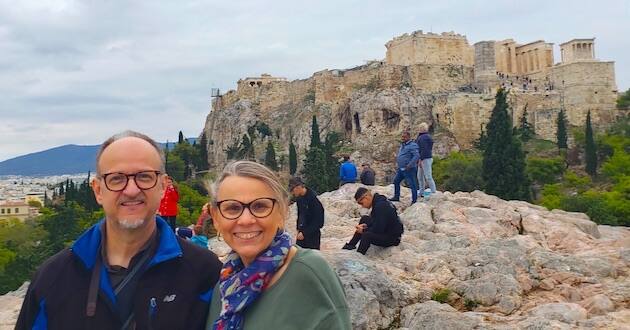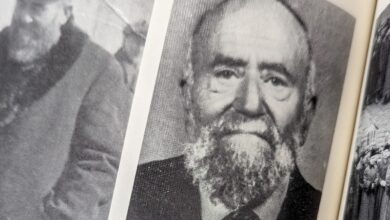
Perhaps my favorite place in Athens is Mars Hill, at the foot of the Acropolis (this is Anita and me standing on it).
You no doubt know the story in Acts of Paul preaching here, but there’s more to it!
After the locals drove him out of Macedonia, Paul arrived in Athens alone, leaving Timothy and Silas behind. I don’t know about you but I don’t enjoy being alone in a new city. As Paul arrives in Athens, perhaps a little dumbstruck, as any “tourist” would be upon first getting into a new city, he does a little sightseeing by his lonesome self.
I picture him walking around a bit perplexed and bemused by the abundance of temples dedicated to gods of all names scattered throughout the city and the level of idol worship. In studying Paul, I sense a little snarky response to what he sees.
So Paul is just walking around the city getting his bearings and talking to those who would listen. Acts 17:16–17 says he was “reasoning in the synagogue with the Jews and the God-fearing Gentiles and in the marketplace every day with those who happened to be present.” He was waiting for his friends to arrive, so he was hanging out in the marketplace—the mall!
One of the idols he had seen was to an “Unknown God,” and he could barely contain himself at their ignorance
One of the idols he had seen was to an “Unknown God,” and he could barely contain himself at their ignorance as he was “provoked within.”
JOIN: Steps of Paul tour departs October 2024
His preaching piqued the interest of the naturally curious Athenians. Verses 18–21 state how the Greek philosophers responded.
“‘He seems to be a preacher of foreign divinities’—because he preached Jesus and the resurrection. And they took hold of him and brought him to the Areopagus [this is Mars Hill]” they said. Everybody knew about Mars Hill. The verse says “all the Athenians and the foreigners who lived there spent their time doing nothing except telling or hearing something new.” They were a curious bunch of people but not afraid of learning something new, especially if it was about a “new” god.

So, they ask, “May we know what this new teaching is that you present? For you bring some strange things to our ears; we wish to know therefore what these things mean.”
How could Paul ever speak in a convincing way to these folks?
Paul responds accordingly and with respect saying, ‘Men of Athens, I see that you are very religious in all respects. While I was passing through and examining the objects of your worship, I also found an altar with this inscription: ‘TO AN UNKNOWN GOD.’
Paul responds that while to the Athenians he is “unknown,” he is really the “God who made the world and everything in it, being Lord of heaven and earth.” Paul says that God does not live in shrines built by men, and that they should seek the one God so they can find him.
Paul next does something unexpected and even daring! He references the famed Greek philosopher and poet Epimenides who lived 600 years earlier. All Greeks knew this poet, and credited him with saving the nation from a plague at the time.
Paul quotes Epimenides with a line from his famous poem: “For in Him we live, move, and exist.” Paul uses their rockstar hero poet of Greek lore to draw them to the Creator of the Universe and Christ. The connection to the ears of the Athenians was unmistakable! Some wanted more saying “We will hear you again about this.” The best part is some believed in Jesus right there on the spot!
Today, our society still worships idols and chases the “unknown god.” Humanity tries to fill that God-sized hole in the heart but nothing fits. Nothing except Christ. This story in Acts is still relevant 2,000 years later! I can’t wait to share Paul’s words as our Steps of Paul tour group stands on Mars Hill on October 11.
If you want to stand there with us, just call us at 816-524-4522 or visit our info page HERE.
–Dwight Widaman | Editor
Dwight and Anita Widaman operate the Metro Voice and find great enjoyment organizing and leading tours to the Holy Land, and now, Greece and Turkey. They speak at churches and community groups with the goal of connecting Christians to their spiritual roots.








